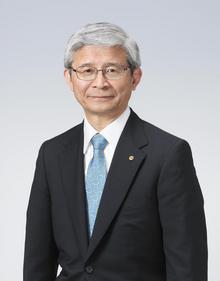Message from the Chairman

I would like to extend my sincere greetings on the occasion of New Year 2025.
The Toyota Foundation celebrated its 50-year anniversary in 2024 since its establishment, and carried out a series of activities in commemoration of the special occasion, including the anniversary grant program called Envisioning Human Society 50 Years Ahead, a symposium on Japan-ASEAN cooperation, and the launch of a dedicated website featuring the Foundation’s activities over the past 50 years. Allow me to again express my heartfelt appreciation to all those people concerned for their support.
The year 2025 marks 80 years since the end of World War II, and the world now sees quite a few formidable challenges. The international order, which has long helped underpin the prosperity of the global economy, is now at risk of collapse, but there is no sight of a new order emerging to replace that old structure. With the sweeping spread of social media use among the public, domestic political situations are increasingly becoming uncertain and unstable primarily in democracies, albeit to varying degrees from country to country. Meanwhile, countries such as China and Russia are saddled with a great number of problems at home. All these are affecting international affairs greatly.
On the other hand, digital technologies such as artificial intelligence (AI), as represented by ChatGPT, have been making astounding progress, and it is no exaggeration to say that things considered impossible to achieve a year ago can be made possible in the following year. Digital technologies have already permeated the economic and social spheres and every facet of our everyday life. While AI is certain to continue advancing at a rapid clip, it is still uncertain as to whether AI will surpass human intelligence in the year 2045 or what some experts call is singularity. That said, in the not-too-distant future, humanity will likely have to confront the most fundamental questions – what humans are really all about and whether humans are capable enough of utilizing AI to their own advantage.
When we turn our attention to Japan, the country is finally crawling out of the long-running economic stagnation since the bursting of the economic bubble in 1991. Over the past three decades, however, Japan has seen a considerable decline in international standing and competitiveness. As a result, Japan’s image of being a technologically advanced nation is now lost. For instance, Japan ranked 31st out of 67 countries and regions surveyed in the 2024 World Digital Competitiveness Ranking, released in November last year by Swiss-based International Institute for Management Development (IMD). Leveraging digital technologies requires a bold review of the existing systems and work procedures when working to introduce such technologies, but Japan has been slow to take necessary steps in that regard. Moreover, it is important to have a mindset of “use and improve at the same time,” in other words, responding quickly to issues as they occur, when it comes to the deployment of digital technologies. And yet, much attention has been focused on technical glitches that have arisen at the time of introduction, which seems to have hindered the very use of such technologies itself.
In the meantime, Japan has entered a so-called “age of population decline” in earnest. The country’s current population of about 124 million, if its demographic trend continues as is, is projected to decrease by 1 million people a year and the number of Japanese citizens is estimated to fall to 63 million by 2100, with the percentage of the elderly exceeding 40%. As the demographic decline continues unabated, what has been considered “normal” is expected to be no longer the case, going forward. Some consequences are already manifesting as real problems in various sectors and different regions of the country.
Under such circumstances, in order to preserve and pass a sustainable Japan that can hold out hopes on to the next generation, what we need to do is to wean ourselves off the conventional assumptions, look squarely at the reality already at hand and inconvenient truths to come, and take prompt and preemptive actions with a long-term perspective.
To that end, what is key is to drastically boost investments in people for fostering human resources and continuing to enhance added value by society as a whole; to maximize the use of digital and AI technologies while revisiting various institutions and systems; to acknowledge the limitations of the public-sector resources held by the government and municipalities and expand the circle of mutual help and voluntary mutual assistance; and to confront a number of various issues, such as creating necessary conditions for migrants to demonstrate their abilities, and cope with those issues flexibly and swiftly by society at large while sharing expertise and experiences at the same time.
With that understanding, the Toyota Foundation has taken several new challenging initiatives in recent years: setting up the theme on “Fostering the Autonomous Society” in the Grant Program for Community Activities for Japan; establishing the Special Subjects “Co-Creating New Society with Advanced Technologies” and “Migrants and Japanese Society;” launching a partnership program aimed at fostering personnel development in collaboration with the Institute for Future Initiatives (IFI), the University of Tokyo; creating the Special Subject Grant Program “Population Decline in Japanese Society” beginning in fiscal 2024; and trying to serve as a hub of networks for sharing expertise and experiences among non-profit organizations.
Built on its ever-evolving 50-year history, the Toyota Foundation begins to take a step this year, looking to the next 50 years. The Foundation has thus far continued to engage in future-oriented grant-making and other activities, and will remain committed to future-looking grant-making and other activities under the banner of foresight, leadership and progressiveness, with a view toward making greater contributions to society from now on, too.
Your strict but warm guidance and encouragement will be greatly appreciated.
January, 2025
Nobuyori Kodaira
Chairman
The Toyota Foundation (Public Interest Incorporated Foundation)
